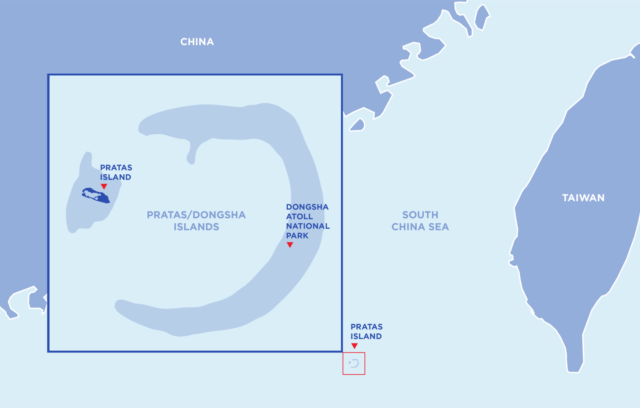October 26, 2021
The Poison Frog Strategy
Preventing a Chinese Fait Accompli Against Taiwanese Islands
Introduction
How could Taiwan and the United States respond if China seized one of Taiwan’s outlying islands, such as Pratas/Dongsha (hereafter Dongsha) in the South China Sea? Whereas the U.S. national security community has focused on defending Taiwan against Chinese invasion, China’s recent military activities suggest that this kind of coercion and limited aggression might be an equally urgent question. More worryingly, such a scenario could be a prelude or pathway to war involving China, Taiwan, and the United States.
Small, disputed islands in the South China Sea have become increasingly contentious over the past year, as China has pursued an aggressive campaign of repeated air incursions into restricted airspace. (Source: Didi Tang, “China’s island war games rattle Taiwan,” The Times, May 15, 2020, https://www.thetimes.co.uk/article/chinas-island-war-games-rattle-taiwan-pdtt5spqw. Adapted by CNAS)
To explore potential policy and strategy options to prevent such a calamity, the Gaming Lab at CNAS wargamed this scenario with Taiwanese, American, and regional experts. Worryingly, the game found few credible options for pushing China to abandon Dongsha and return to the status quo. However, the game found numerous areas where preparation and multilateral coordination—particularly in concert with Japan—could deter limited Chinese aggression against Taiwan.
During the game, the teams representing the United States and Taiwan struggled to compel a Chinese withdrawal from Dongsha without escalating the crisis. The team representing China avoided further escalation given its first-mover advantage, constrained territorial gains, and geographic proximity. In contrast, the U.S. team had to push its forces far forward in ways that were risky and would be difficult to sustain.1 Punitive non-military options, such as economic sanctions or information campaigns, took too long to produce effects and appeared too weak to compel China to abandon its gains.2 More aggressive military responses risked escalation to war, which both the U.S. and Taiwan teams wished to avoid. With few viable coercive options and the onus of escalation falling on the U.S. and Taiwan teams, the game reaffirmed the difficulty of rolling back territorial aggression of this kind.
Indeed, discouraging China from seizing Taiwanese territory before it happens is the most salient lesson of the game. The United States and Taiwan must begin coordinating today to build a credible deterrent against limited Chinese aggression or coercion toward Taiwan.3 Doing so will help identify ways to make a territorial fait accompli by China—such as the seizure of Dongsha—too unpalatable to consider, while also communicating the U.S. commitment to defending Taiwan. This strategy will require advance planning and communication of joint responses and defenses against coercion and territorial aggression. Rather than scrambling to respond to a fait accompli, as occurred in this game, the United States and Taiwan should prepare to implement coordinated, whole-of-government deterrent measures quickly and ensure immediate consequences for Chinese coercion or aggression short of war.
Japan’s cooperation is essential in this type of scenario because it could change China’s calculations of the military and diplomatic risks of coercion or aggression. A joint statement from Japanese Prime Minister Yoshihide Suga and U.S. President Joseph R. Biden in April 2021 referenced “peace and stability across the Taiwan Strait” and encouraged “the peaceful resolution of cross-Strait issues.”4 The United States would rely heavily on Japan for basing infrastructure to conduct military operations to support Taiwan.5 And, although the statement did not elaborate further, unambiguous Japanese support will be necessary to create a regional, as opposed to bilateral U.S.-Taiwan, response to Chinese coercion or aggression. Specifically, Japan’s involvement could enable coordination with India and Australia via the Quad relationships.6 It could also create opportunities to work with other states facing Chinese coercion and territorial aggression, such as Vietnam and the Philippines.
Wargames are not predictive, but they are useful tools for exploring decision-making and identifying vulnerabilities. As China’s assertiveness rises, failure to prepare for the threat of an incursion against Taiwanese territory presents grave risks to Indo-Pacific security. The United States, Taiwan, and regional allies and partners can better understand how to build an effective deterrence strategy to discourage Chinese aggression or coercion through multilateral gaming, to include crisis simulations and exercises.
Download the Full Report.
- For more on the challenges of deterring sub-conventional aggression, see Stacie Pettyjohn, Becca Wasser, and Jennie Matuschak, “Risky Business: Future Strategy and Force Options for the Defense Department (Center for a New American Security, July 20, 2021), 20, https://s3.us-east-1.amazonaws.com/files.cnas.org/documents/RiskyBusiness_Budget22_Web.pdf?mtime=20210720095157&focal=none. ↩
- For more on possible U.S. coercive economic measures, see Elizabeth Rosenberg, Peter Harrell, and Ashley Feng, “A New Arsenal for Competition: Coercive Economic Measures in the U.S.-China Relationship” (Center for a New American Security, April 24, 2020), https://www.cnas.org/publications/reports/a-new-arsenal-for-competition. ↩
- For more on the greater relative difficulty of coercion versus deterrence, see Thomas C. Schelling, Arms and Influence (New Haven, CT: Yale University Press, 1966). ↩
- White House Briefing Room, “U.S.-Japan Joint Leaders’ Statement: ‘U.S.-Japan Global Partnership for a New Era,’” April 16, 2021, https://www.whitehouse.gov/briefing-room/statements-releases/2021/04/16/u-s-japan-joint-leaders-statement-u-s-japan-global-partnership-for-a-new-era. ↩
- Brad Lendon, “Japan increases protection for US military amid ‘severe security environment,’” CNN, February 24, 2021, https://www.cnn.com/2021/02/24/asia/japan-us-mutual-defense-intl-hnk-ml/index.html; Jeffrey W. Hornung, “What the United States Wants from Japan in Taiwan,” Foreign Policy, May 10, 2021, https://foreignpolicy.com/2021/05/10/what-the-united-states-wants-from-japan-in-taiwan/. ↩
- Natasha Kassam, “Taipei’s growing legion of friends,” The Interpreter, July 13, 2021, https://www.lowyinstitute.org/the-interpreter/taipei-s-growing-legion-friends. ↩
More from CNAS
-
It’s Time for a True Industrial Strategy for American National Security
For an industrial strategy to work, the president must make it a White House priority that pulls together all elements of national power....
By Becca Wasser & Mara Rudman
-
How We Survive Ep 5: Wargames
Dr. Ed McGrady, Adjunct Senior Fellow for the Defense Program at CNAS, joins the show to discuss how climate began to factor into humanitarian crisis war games as far back as ...
By Dr. ED McGrady
-
Wars Are Not Accidents
The road to conflict is an action-reaction process. Leaders decide whether and how to respond to a rival’s moves, and they often search for ways to lower the temperature. Esca...
By Erik Lin-Greenberg
-
Defense / Indo-Pacific Security
Bad Blood: The TTX for the House Select Committee on Strategic Competition Between the United States and the Chinese Communist Party (CCP)I. Introduction Chairman Gallagher, Ranking Member Krishnamoorthi, distinguished members of the committee and staff, thank you for inviting me to come today to talk about the ...
By Stacie Pettyjohn, Becca Wasser & Andrew Metrick








